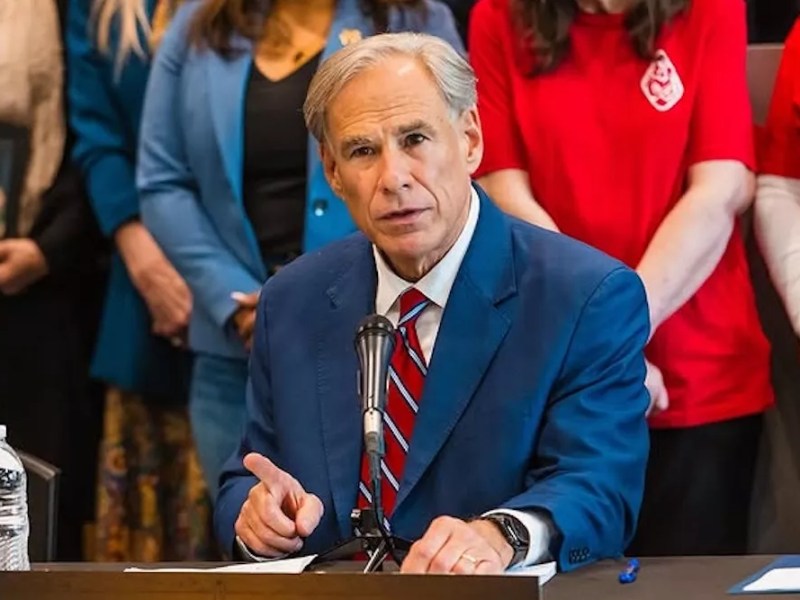This text was initially revealed by Votebeat, a nonprofit information group protecting native election administration and voting entry. Votebeat is a nonprofit information group reporting on voting entry and election administration throughout the U.S. Join Votebeat Texas’ free publication right here.

Texans’ ballots for subsequent month’s election embody 17 proposed amendments to the state structure, together with one clarifying {that a} voter have to be a United States citizen.
Republicans in Texas and throughout the nation have for years been elevating alarm about the potential for noncitizens casting ballots, though such instances are uncommon, and individuals who vote illegally danger critical penalties, together with deportation.
The modification wouldn’t have a lot sensible impact, because it primarily restates what’s already in state legislation. However it will “make it crystal clear beneath the state structure that should you’re not a U.S. citizen you’re not allowed to vote in Texas,” Gov. Greg Abbott stated in a social media publish.
An effort to require all Texas to point out proof of citizenship to register to vote did not cross within the legislature this yr.
Constitutional amendments are the one state measures voters in Texas will see on their poll this yr. They’ll seem on the high of the poll and above any native races or measures.
Early voting will run till Oct. 31, and Election Day is Nov. 4. The deadline for counties to obtain functions to vote by mail is Oct. 24. Mail ballots have to be obtained by 7 p.m. on Election Day to be counted.
Right here’s what you should know in regards to the citizenship proposal:
What does the proposed constitutional modification appear like?
You’ll see it as Proposition 16 in your poll. It was launched as Senate Joint Decision 37 and written by Sen. Brian Birdwell, a Republican from North Texas. The Legislature permitted its addition to the poll in the course of the common session.
It says, “the constitutional modification clarifying {that a} voter have to be a United States citizen,” and voters can choose sure or no.
What would it not do?
It could amend Article 6 of the Texas Structure, which lists teams that aren’t allowed to vote in Texas. Article 6 at the moment prohibits voting by folks beneath 18 years previous; anybody who has been deemed incompetent by a court docket; and anybody who has been convicted of a felony. The proposed modification would add to that record “individuals who usually are not residents of the US.”
Nonetheless, being a U.S. citizen is already a requirement to vote in federal elections beneath federal legislation, and state legislation says that solely U.S. residents and Texas residents are eligible to vote. That’s why Texans are requested to attest whether or not they’re U.S. residents when filling out a voter registration card. Anybody who attests on the shape that they don’t seem to be residents wouldn’t be allowed to register.
Noncitizens who vote face state and federal felony prices and could possibly be vulnerable to deportation.
Even when it’s permitted by voters, the measure wouldn’t require voters to point out documentary proof – corresponding to a start certificates or a U.S. passport — to register to vote.
What are the arguments for and in opposition to the modification?
Birdwell stated throughout a public listening to on the proposal earlier this yr, that the language within the state structure would affirm citizenship as a requirement for voting and complement federal legislation.
Some voting rights activists opposing the modification stated on the time that it will be redundant, because the citizenship requirement is already in place. Others apprehensive the language could mislead voters into believing noncitizens are voting en masse.
There’s been little campaigning over the modification on both aspect.
Produce other states thought of comparable measures
Sure. South Dakota, Idaho, Iowa, Kentucky, Missouri, North Carolina, South Carolina, and Oklahoma not too long ago handed comparable constitutional amendments, in response to the Nationwide Convention of State Legislatures.
And final fall, voters in Wisconsin overwhelmingly permitted a GOP-backed measure to vary constitutional language that claims “each” U.S. citizen 18 or older has a proper to vote. The brand new wording says “solely” a U.S. citizen 18 or older can vote in nationwide, state, and native elections, successfully closing the door to any native ordinances that will permit noncitizens to vote. The modification handed with roughly 70% of the vote.
Natalia Contreras covers election administration and voting entry for Votebeat in partnership with the Texas Tribune. She’s based mostly in Corpus Christi. Contact Natalia at ncontreras@votebeat.org.
Votebeat is a nonprofit information group protecting native election integrity and voting entry. Join their newsletters right here.
Subscribe to SA Present newsletters.
Observe us: Apple Information | Google Information | NewsBreak | Reddit | Instagram | Fb | Twitter | Or join our RSS Feed








